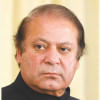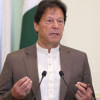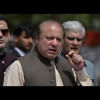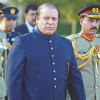Six judges' defiant act in Pakistan

Following the huge rigging against Imran Khan's party (PTI) in recent elections, Pakistan now faces another big controversy. Six judges of the Islamabad High Court say they have been facing pressure for months from army intelligence agencies to give verdicts against PTI.
Pakistan has a history of dubious verdicts against politicians given by its judiciary under the pressure of unelected forces. In the 1950s, in united Pakistan, then Governor General Ghulam Muhammad fired the Bangalee Prime Minister Nazimuddin and later dissolved the Constituent Assembly. Maulvi Tamizuddin, the assembly's Bangalee president, challenged this illegal step, but the Supreme Court, under pressure, validated it. In 1968, courts under dictator Ayub Khan's pressure dubiously convicted Sheikh Mujibur Rahman and other Awami Leaguers for alleged links with India, but later reversed it under public pressure. These verdicts crippled Pakistan's democracy and led to the 1971 war. Even later, the army often used the judiciary as a tool for political engineering to remove dissident politicians. In 1977, courts under General Zia wrongly sent former Prime Minister Bhutto to death.
The most recent cycle goes back to 2017 after two fair elections. The army rigged the 2018 elections to defeat Nawaz Sharif by disqualifying him via dubious court verdicts and help Imran Khan win. These verdicts were reversed when Nawaz Sharif regained the army's nod and Imran Khan fell out of favour. Imran himself was disqualified through dubious verdicts just before the 2024 elections. The letter by the six judges to the Supreme Judicial Council, the body responsible for managing the codes of conduct for Pakistani judges, requests the council to provide more guidance to judges on how to deal with and report pressures from agencies, which they have been facing since May 2023 in cases against PTI.
Some judges received anonymous WhatsApp messages purportedly from intelligence agents asking them to pursue a case against Imran Khan for having a daughter out of wedlock with an American billionairess. Another judge discovered a recording camera in his house. The relative of one judge was kidnapped to put pressure on him. The six judges had reported these matters last year to their own chief justice and also to the chief justice and senior judge of the Supreme Court. But none of them took any concrete steps and the meddling continued. The judges said they did not know how to proceed further and thus requested the council to provide guidance.
The letter has caused a huge storm in Pakistani politics. In the backdrop of a situation where most major political parties and media groups have surrendered to the army's role in politics, it has come as the strongest act of defiance by the judiciary against the army after the historic refusal by nine Supreme Court judges to validate General Musharraf's suspension of constitution in 2007. The junior judges, with the senior most being less than 10 years in service and the other five confirmed as judges in the last two years, represent a new generation of judges unwilling to toe the army's diktat.
When the letter leaked to the media, the chief justice of Supreme Court (who earlier ignored the judges' plea last year and also gave a dubious verdict depriving PTI of its election symbol during the last elections) reportedly severely reprimanded the judges for writing the letter even though it was a legitimate plea sent privately to the council. He then asked the government to establish a commission to investigate the claims. But this caused a public furore, and 300 leading lawyers published a public letter asking the Supreme Court to handle the matter itself since the government itself accused in the letter could not tackle the matter properly. Bowing to these pressures, the court is now handling the matter itself. Seventeen senior judges across Pakistan have received threatening letters laced with arsenic in the last few days. Yet, it's unclear whether this judicial revolt can loosen the army's grip given that major political parties and senior judges have acquiesced to it.
Since investigation will still be done by state agencies, it will be hard for the court to find strong proof to convict specific people given how covertly intelligence agencies work. Yet, there is sufficient evidence from this case and earlier ones for the court to strongly ask the government to reform the agencies and itself strengthen its judicial codes of conduct to reduce interference in judiciary. Demand-side steps to reduce the ability of intelligence agencies to interfere include the formulation of clear laws on their functions; transparency about their budgets and structures; regular reporting by the executive to a bipartisan parliamentary panel, the Supreme Court and media on steps taken to curb such meddling; and the establishment of a long-term mechanism by courts to monitor such steps.
Supply-side steps to reduce judges' acquiescence include having a section in judges' code of conduct making it mandatory for all judges to report meddling with failure to do so attracting prosecution; regular awareness raising for judges on this issue; clear mechanisms in courts to transparently record complaints by judges, take immediate action and report it to parliament and media; institution of multiple senior judge benches for high-profile political cases; reminders to such benches to immediately report any meddling and closely monitor any deviations from set procedures in such cases; and interrogation of all judges who gave wrong verdicts against Nawaz and Imran in recent years, many of which have been overturned.
It is also critical that other judges, journalists, bureaucrats, etc facing such pressures from intelligence agencies step forward immediately to help build further pressure on the government and courts to take these steps. Only through such concerted and sustained efforts by society can such army meddling be ended permanently.
Dr Niaz Murtaza is an Islamabad-based political economist with a PhD from the University of California, Berkeley. He can be reached at [email protected]. His X handle is @NiazMurtaza2
Views expressed in this article are the author's own.
Follow The Daily Star Opinion on Facebook for the latest opinions, commentaries and analyses by experts and professionals. To contribute your article or letter to The Daily Star Opinion, see our guidelines for submission.

 For all latest news, follow The Daily Star's Google News channel.
For all latest news, follow The Daily Star's Google News channel. 










Comments